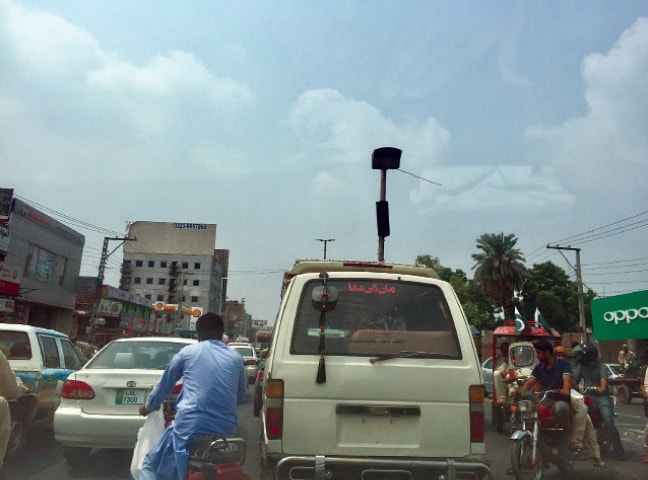By By Iftikhar Ahmed
FAISALABAD, Jan 5 (APP): With unbridled population growth, traffic mess in Faisalabad is a microcosm of the challenges faced by rapidly growing cities in developing countries, leaving commuters in complete disarray.
The bustling arteries of the city have become a daily ordeal with increasing traffic congestion, turning routine commutes into exhausting endeavors, also affecting their productivity and well-being.
These roads designed meticulously decades ago to accommodate a much smaller population are now grappling with an overwhelming traffic load and this gridlock hampers daily routine of people, also affecting their health and environment.
The iconic Clock Tower (Ghanta Ghar), surrounded by its eight bazaars and adjacent areas have become traffic bottlenecks with overwhelming mix of vehicles, pedestrians and vendors. Commercial activity in these areas adds to chaos, turning even a short trip into a time-consuming struggle.
Sidewalks have disappeared and unregulated encroachments, makeshift stalls and illegal parking on already limited road space, leave drivers to navigate an obstacle course of vendors and parked vehicles.
Traders’ organizations keep demanding action against encroachers but sometimes they themselves have negotiated dubious agreements allowing encroachers to use footpaths and spaces in front of their shops.
Although traffic police remain active to regulate vehicular traffic, yet mushroom encroachments foil their efforts largely. Past initiatives like relocating squatters and vendors to designated markets proved futile as many of them sold their allocated spaces and returned to occupy same roadsides.
The problem worsened when the vendors were allowed to use five feet of road space for their businesses. This leniency led to further encroachments when the vendors expanded their operations to ten feet or more, narrowing busy roads.
“Our city has witnessed exponential rise in vehicles due to growing population and expanding industrial landscape,” remarked Farzand Ali Jatt, a veteran educationist. “The roads that once spacious enough, now resembled clogged veins, with vehicles inching forward during peak hours.”
He said lack of public transportation had exacerbated the problem with more people using personal vehicles, bikes and rickshaw making key roads leading from Faisalabad to Jhang, Sargodha, Samundri, Jaranwala, Satiana and Canal Road, the hotspots for traffic snarls.
These roads were frequently choked with vehicles ranging from rickshaws and motorbikes to heavy trucks and public buses. Planned U-turns are often ignored as the drivers opt for shortcuts by violating traffic rules and creating bottlenecks.
“QingQi rickshaw culture has become a real nuisance and this chaos further exacerbated with motorcycles modification into passenger vehicles operating without regulation,” he added. “Wrong-way driving and signal jumping are frequent mocking traffic regulators and resulting in accidents and making roads perilous for other users.”
He also mentioned to improper planning and maintenance, potholes, unmarked lanes and poorly timed traffic signals as other reasons for traffic snarls.
According to recommendations of P&W Board, any arterial road bearing more than 8000 vehicles must dualized. But such roads dualized already like Faisalabad-Sheikhupura Road and Faisalabad Chiniot Road respectively experience more than 23000 and 17000 vehicles per day. The situation is similar on other roads.
Altaf Hussain, a professional driver commented that city’s public transport system, consisting of outdated and overcrowded vans, failed to meet the needs of people who have to use personal vehicles. “Although the ride-hailing services were convenient, yet they had also led to increase in vehicles on roads overburdening the infrastructure.”
A local transporter Muhammad Abu Bakar mentioned to economic repercussions of traffic congestion and said, delay in goods transportation affects our business and increases cost of commodities.
He suggested to improve infrastructure by widening roads, improving intersections and developing bypasses to divert heavy traffic. “Improving public transport system, introducing modern public buses, enforcing traffic regulations strictly and removing encroachments can help address the problem. Faisalabad deserves a transport system that matches its aspirations.”
Health expert Dr Muhammad Qamar sees this issue in health’s perspective mentioning to idling vehicles adding to air and noise pollution. “Commuters frequently sticking in suffer from stress, frustration and anxiety besides inhaling polluted air.”
When contacted to comment on this situation, Muhammad Asif Chaudhary Managing Director (MD) Faisalabad Development Authority (FDA) informed that Punjab government was gearing up to launch metro bus service to address this issue. “This mega project would transform intra-city travel by offering affordable and efficient transport for people.”
He said Asian Development Bank (ADB) had committed to fund this project estimated to cost Rs.70 billion. “Initially, 100 environment-friendly buses would be run on eight high-demand routes having heavy passengers load to offer a reliable alternative for daily commuters.”
Asif also informed about expanding the bus network to 35 routes later on to cover significant portion of the city. “This expansion would be a game-changer for traffic management on major city roads and maintaining sustainable urban mobility.”
He said as traffic mess on Faisalabad’s main roads had become a critical issue, the metro bus service is expected to ease burden on busy routes. “The FDA was consulting stakeholders to finalize preparations for the project and its smooth execution in a phased manner.”
“Once operational, the metro bus service would become a cornerstone of Faisalabad’s urban infrastructure by alleviating traffic congestion, reducing environmental pollution and reshaping city’s public transport landscape,” Asif said.
APP/iah/maz (APP Feature Service)

